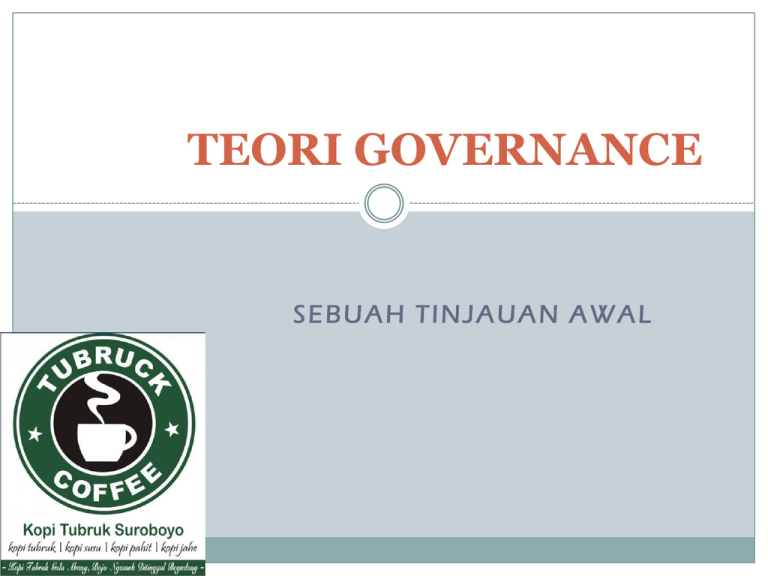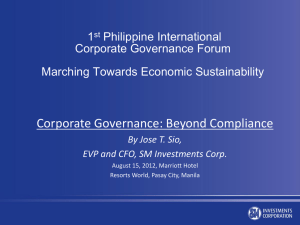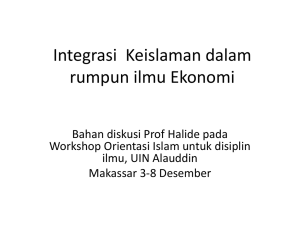pert 1 governance theory
advertisement

TEORI GOVERNANCE SEBUAH TINJAUAN AWAL Governance as a Field of Study Elemen Studi The Subject Matter (Focus) Setting Kontekstual Kemunculan Konten Material Dimensi The Locus Metodologi dan Aksiologi Jenis Teori Teori Deskriptif- Eksplanatif Teori Normatif Teori Asumtif Teori Instrumental Governance theory helps to better frame an understanding of how the processes of collective decision making fail or succeed in our societies. The study of governance is focused not just on aiding a better understanding of part of our world, but also has a concern with how the functioning and operation of that world could be made better. Governance theory is interested not just in offering explanation, it also seeks to provide advice. It has the character of being both concerned with ‘what is’ and ‘what might be’. Governance scholars are interested in how governance arrangements are chosen (intentionally or unintentionally), how they are maintained or how they are changed The Rise of Governance Scientific Validity Science Policy Relevant Respond to The Changing Environment The end of 20th or the beginning of 21th Public Administration Scientific Validity Economic (development) Globalization The Spread of Democracy Inf-Knowledge Based Society Unsatisfactionary of NPM Policy Relevant Use Gidden (2000) illustration as “The Third Way” Stoker (2009: 8) : Contextual of The Rise of Governance Something fundamental is happening to our economies and the umbrella term ‘globalisation’ is a good one to capture what is going on. There has been a strong trend towards a world of more rapid world-wide communication, closer connections between peoples and organsations and a greater sense of interconnectedness. Economies appear to be more interconnected, patterns of migration have taken on powerful and challenging directions, environmental pressures on the world’s resources seem to be both more intertwined and more pressing than in the past and the speed and pace of communication and the sharing of ideas and practices throughout the world appears to be offering new opportunities but also threats. We live in a world where there is a significant further development towards a global market in which patterns of production and consumption are organised by transnational companies and other related organisations, operating across national boundaries. Global finance markets and patterns of international trade in turn influence the shape of national economies. What Governance tells us??? It describes changes in the nature and role of the state—a shift from bureaucracy to markets and networks. It also denotes a program for global reform Governance describe and theorize changes in our world (This language has spread across numerous disciplines, including political science, economics, sociology, and public administration) Governance also remakes our world The key themes for the future of PA: (Bovaird, 2001) 1. 2. 3. 4. 5. 6. 7. Governance, not just government—‘‘power to the stakeholders’’ Stakeholder-based analysis, not just public sector perspectives Network analysis—public service and public interest organizations that are joined up, not just stand-alone Self-organizing within complex adaptive systems, not just ‘‘restructuring’’ Evidence-based policy and management—‘‘what matters is what works’’ —not just performance measurement Organizational learning and innovation, not just ‘‘reforms’’ User and community coproduction, not just professional and political paternalism Governance dapat dipandang sebagai : (John Pierre dan B. Guy Peters, 2000). Sebagai suatu sistem hirarki dalam struktur organisasi, governance dimaknai sebagai perubahan hirarki yang fleksibel dari pucuk pimpinan atas ke bawah. Sebagai suatu sistem networking menunjuk pada suatu titik dimana pelibatan semua elemen masyarakat sangat dikedepankan dan munculnya jejaring kebijakan. Sebagai sistem pasar, governance lebih menekankan terjadinya mekanisme kerjasama antar stakeholders dalam memecahkan masalah bersama tanpa ada pihak yang dirugikan dan peran pemerintah tidak mendominasi. Governance’s definitions ‘‘Governance’’ will be interpreted to mean the set of rules, structures and procedures which give stakeholders some power to influence the decisions which affect their welfare (Bovaird and Loeffler, 2001) Governance is about the rules of collective decision-making in settings where there are a plurality of actors or organisations and where no formal control system can dictate the terms of the relationship between these actors and organisations (Stoker, 2009) the way state power is used in managing economic and social resources for development and society.” (The World Bank) “the exercise of political, economic and administrative authority to manage a nation’s affair at all levels. It is the complex mechanisms, process, relationships and institutions through which citizens and groups articulate their interests, exercise their rights and obligations and mediate their differences” (UNDP,1997) 5 Proposisi penting dalam mewujudkan Governance (Stoker, 1998) : 1. 2. 3. Menunjuk pada seperangkat institusi dan aktor yang berasal dari dalam maupun diluar birokrasi pemerintah Governance mengakui batas dan tanggungjawab yang kabur dalam menangani masalah sosial ekonomi Governance mengenal adanya saling ketergantungan di antara institusi2 yang terlibat dalam tindakan bersama Lanjutan : 4. Governance berkenaan dengan jaringan kerja berbagai aktor yang mandiri dan otonom 5. Governance memahami kapasitas untuk menyelesaikan semua masalah yang tidak sepenuhnya tergantung kewenangannya, tetapi governance percaya pemerintah mampu menggunakan cara2 dan tehnik2 baru untuk mengarahkan dan membimbing Government dan Governance Government (Stoker, 1998) menunjuk pada : 1. 2. 3. 4. Institusi negara yang resmi Monopoli kekuasaan pemaksa yang sah Kemampuannya untuk membuat keputusan dan kapasitas menegakkan pemberlakuaanya Proses2 formal dan institusional yang berlangsung pada level negara nasional untuk menjaga ketertiban masyarakat dan memfasilitasi tindakan bersama Governance lebih menunjuk pada : 1. 2. 3. 4. Perubahan makna pemerintah Menunjuk pada proses memerintah yang baru Kondisi tata cara memerintah yang berubah Metode baru bagaimana masyarakat diperintah Government & Governance Government Governance Pengertian Berarti badan/ lembaga/fungsi yang dijalankan oleh suatu organ tertinggi dalam suatu negara Dapat berarti cara, penggunaan atau pelaksanaan Sifat hubungan Hierarkhis, dalam arti yang memerintah berada di atas, sedang WN yang diperintah ada di bawah Herarkhis, dalam arti ada kesetaraan kedudukan dan hanya berbeda dalam fungsi Komponen yang terlibat Sebagai subyek hanya ada satu institusi yaitu pemerintahan Ada tiga komponen yang terlibat : state, privat dan society Pemegang peran dominan Sektor pemerintah Semua memegang peran sesuai dengan fungsinya masing-masing Efek yang diharapkan Kepatuhan warganegara Partisipasi warganegara Hasil akhir yang diharapkan Pencapaian tujuan negara melalui kepatuhan warganegara Pencapaian tujuan negara dan tujuan masyarakat melalui partisipasi sebagai WN maupun sebagai masyarakat Perbandingan PERBEDAAN PERSPEKTIF NPM & GOVERNANCE 17 NPM = Corporate Values + Public Sector MNG Gov = Public Need + Democracy NPM = outcomes (the how much of results) Gov = process (the how of policy) NPM = Institutionalism & Public Choice (eco) Gov = Relationship government + society (pol) NPM = Replace bureau with corporate management Gov = Retain government capacity to control public sector resource NPM = Market based cultural revolution Gov = Cooperative arrangements with private sector www.themegallery.com OPA WEBERIAN VALUES • • • • COMPETENCE ETHICS ACCOUNTABILITY CAREER ORIENTED IMPARTIAL NPA SOCIAL CONCERN • EQUITY • EQUALITY • JUSTICE GOVERNANCE NPM BEST MANAGERIAL PRACTICE • EFFICIENCY • CONSUMER’S SATISFACTION • DEMOKRASI • NETWORK • STAKEHOLDERS • • • • COLLABORATIVE PARTICIPATORY INCLUSIVE TRANSPARANT PARTIAL Unibraw_2009 57 NPS dan Governance Democratic citizenship Model komunitas dan civil society Bertindak Demokratis dan akuntabel Deliberative and shared value Serving not steering Political participation and civic engagement Power sharing and democratic Collaborativeparticipatory process Corporate governance, citizen/communitarian governance NPS memiliki basis nilai yg sangat mirip dengan governance Menunjuk pada varian model governance yg ada, NPS cenderung mengarah pada apa yg disebut Box (….) dengan Citizen Governance atau communitarian governance, dan apa yang disebut Bovaird & Loffler dengan Public Governance Demokrasi merupakan titik temu utama antara NPS dan Governance & GOVERNANCE DEMOKRASI Dimensi Politik Governance : Interconectedness politik & dimensi governance lainnya Decision making context Kekuasaan dan distribusinya power over society power equal society society over power (governance paradigm) Proses asosiasi, artikulasi, dan kontestasi kepentingan Involving lembaga politik Tata hubungan, relasi, antar kelompok kepentingan atau stakeholder Demokrasi sebagai nilai dasar governance Demokrasi : Indikator Utama Politik Tumbuh-kembangnya political institution Government (‘s monopoly) failure Demokrasi sebagai agenda utama pembangunan dan transformasi politik Kemajuan dan pertumbuhan ekonomi dipandang berkaitan dengan demokrasi Penguatan entitas non-negara Nilai Dasar & Indikator Demokrasi Perluasan ruang publik Transparansi Relasi antar aktor Akuntabilitas publik : eksternal-internal Citizenship Partisipasi Law and social equity and equality Rule of the game Relasi Governance & Democracy (Jon Pierre , 2000) Ecoomic Dev DEMOKRATISASI GOVERNANCE Five governance Area Institutionalism Corpo. gov NPM Redefinisi Demokrasi Network, Partnership, & Deliberative Penjelasan : menurut Pierre, area ke 3, 4, dan 5 yang menjadikan pentingnya demokrasi bagi governance Relasi Governance & Demokrasi Robert Dahl (1971) ‘a key characteristic of democracy is the continuing responsiveness of the government to the preferences of its citizens, considered as political equals’; Menurut Dahl ada dua dimensi di dalam demokrasi, yaitu public contestations dan the right to participate David Beetham (1992) ‘a mode of decision-making about collectively binding rules and policies over which the people exercise control, and the most democratic arrangement to be that where all members of the collectivity enjoy effective equal rights to take part in such decision-making directly Relasi Governance & Demokrasi Terletak pada nilai dasarnya Semua stakeholder adalah entitas politik Demokrasi adalah alasan sekaligus prasyarat terwujudnya governance Multidimensi dan kompleksitas governance menuntut perubahan konsep demokrasi Representative dan Associative Democracy Associative Representative Through formally Formal and non formal political institution Formally political mechanism Limited political actors Indirect political relation Majority decision making Legal and constitutional approach (Jon Pierre, 2000) political institution Formal and non formal mechanism Unlimited and extensive political actors (pluralistic) Collaborative relation Deliberate decision making (dialogue or discourse) Deliberative Democracy Demokrasi Liberal Demokrasi Republikan Demokrasi Deliberatif Demokrasi hanya sebaga penghubung aparat politikmasyarakat Negara hanya sebagai pelindung (pasif) Basis nilai kebebasan individu Tugas individu menyusun struktur pasar Basis nilai adalah peleburan individu dalam komunitas dan suara mayoritas Negara dipandang sama dengan organisasi masyarakat Masalah untuk suara minoritas Jurgen Habermas, (1989) Deliberative Democracy Tidak berdasar kebebasan individu dan suara mayoritas Menekankan pada rasionalitas yang mumpuni dalam proses memutuskan kebijakan, saling mengerti, partisipan Tidak bergantung pada aksi kolektif, tapi pada terlembaganya keterhubungan prosedur komunikasi Individu sebagai citizen yang diskursif Diskursif secara inklusif dan menjadi kuasa paling utama (kuasa komunikasi) Consensus orientation Proses-proses deliberatif juga disuarakan Denhardt & Denhardt Pasar dan Demokrasi Pasar bukan sekedar institusi ekonomi, tetapi juga politik yang memiliki tanggung jawab demokrasi Demokrasi pasar dijalankan dengan “Exit-voice” theory Kompetisi a perfect market can produce perfect regulation Demokrasi pasar melihat pilihan publik sebagai agregasi kepentingan individual GOVERNANCE & NETWORK: GOVERNANCE AS NETWORK AND GOVERNANCE OF THE NETWORK Key Words: Non Hierarchical Negotiated Interaction Interorganizational relation Rooted : Political and Organization Theory Emperical Background : widespread of fragmentation, complexity, dynamic governance network as: 1. 2. 3. 4. 5. a relatively stable horizontal articulation of interdependent, but operationally autonomous actors; who interact through negotiations; which take place within a regulative, normative, cognitive and imaginary framework; that is self-regulating within limits set by external agencies; and which contributes to the production of public purpose 1. How can we explain the formation, functioning and development of governance networks? 2. What are the sources of governance network failure and the conditions of success? 3. How can inter alia public authorities regulate self-regulating governance networks through different kinds of metagovernance? 4. What are the democratic problems and potentials inherent to network governance? INTERDEPENDENCY interorganizational medium for interest mediation between interdependent, but conflicting actors each of whom has a rule and resource base of their own GOVERNMENTALITY an attempt of an increasingly reflexive and facilitating state to mobilize and shape the free actions of self-governing actors. Governance networks are construed as a political response to the failure of neo-liberalism to realize its key goal of ‘less state and more market’ INTEGRATION as a relatively institutionalized field of interaction between relevant and affected actors that are integrated in a community defined by common norms and perceptions GOVERNABILITY a horizontal coordination between autonomous actors who interact in and through different negotiation games Stephen Osborne (NPG, 2010)







